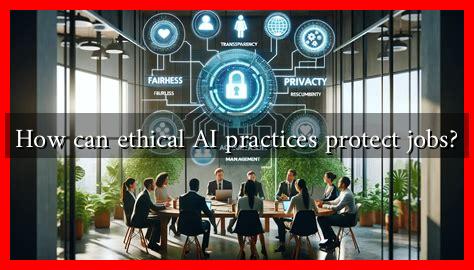-
Table of Contents
How Can Ethical AI Practices Protect Jobs?
As artificial intelligence (AI) continues to evolve and integrate into various sectors, the conversation surrounding its impact on employment has intensified. While many fear that AI will lead to job displacement, ethical AI practices can actually serve as a protective mechanism for jobs. This article explores how ethical AI can safeguard employment, enhance job quality, and foster a more equitable workforce.
The Role of Ethical AI in Employment
Ethical AI refers to the development and deployment of AI systems that prioritize fairness, accountability, transparency, and respect for human rights. By adhering to these principles, organizations can mitigate the risks associated with AI, particularly in the job market. Here are several ways ethical AI practices can protect jobs:
- Enhancing Job Quality: Ethical AI can automate mundane tasks, allowing employees to focus on more complex and fulfilling work. For instance, in the healthcare sector, AI can handle administrative tasks, enabling healthcare professionals to spend more time with patients.
- Supporting Workforce Development: Ethical AI initiatives often include training programs that help workers adapt to new technologies. Companies that invest in reskilling their employees can ensure that their workforce remains relevant and competitive.
- Promoting Fair Hiring Practices: AI can help eliminate biases in recruitment processes. By using ethical AI tools that focus on skills and qualifications rather than demographic factors, companies can create a more diverse and inclusive workforce.
Case Studies: Ethical AI in Action
Several organizations have successfully implemented ethical AI practices that not only protect jobs but also enhance overall productivity. Here are a few notable examples:
- IBM’s AI Ethics Board: IBM has established an AI Ethics Board to oversee the development of its AI technologies. This board ensures that AI applications are designed to augment human capabilities rather than replace them. By focusing on collaboration between humans and machines, IBM has been able to maintain a stable workforce while innovating.
- Unilever’s AI-Driven Recruitment: Unilever employs AI to streamline its recruitment process. By using AI to analyze candidates’ skills and experiences, the company has reduced bias and improved diversity in hiring. This approach not only protects jobs but also creates a more equitable workplace.
- Accenture’s Reskilling Initiatives: Accenture has invested heavily in reskilling its employees to adapt to AI technologies. By providing training in data analytics and AI management, the company ensures that its workforce is equipped to thrive in an AI-driven environment.
Statistics Highlighting the Impact of Ethical AI
Research indicates that ethical AI practices can lead to positive employment outcomes. According to a report by the World Economic Forum, it is estimated that by 2025, AI will create 97 million new jobs globally, while displacing 85 million. This net gain in employment underscores the potential of ethical AI to enhance job opportunities.
Furthermore, a study by McKinsey found that companies that prioritize ethical AI practices are 1.5 times more likely to experience higher employee satisfaction and retention rates. This suggests that ethical considerations in AI development can lead to a more engaged and stable workforce.
Challenges and Considerations
While the benefits of ethical AI are clear, challenges remain. Organizations must navigate issues such as:
- Implementation Costs: Developing ethical AI systems can be resource-intensive, requiring investment in technology and training.
- Regulatory Compliance: Companies must ensure that their AI practices comply with evolving regulations, which can vary by region.
- Public Perception: Gaining trust from employees and the public is crucial. Organizations must communicate their ethical AI initiatives effectively to mitigate fears of job loss.
Conclusion
Ethical AI practices have the potential to protect jobs by enhancing job quality, supporting workforce development, and promoting fair hiring practices. As demonstrated by various case studies, organizations that prioritize ethical considerations in AI development can create a more equitable and sustainable workforce. While challenges exist, the benefits of ethical AI far outweigh the risks, making it a crucial component of the future of work. By embracing ethical AI, companies can not only safeguard jobs but also foster innovation and growth in an increasingly automated world.
For further reading on ethical AI practices, you can explore resources from the World Economic Forum.

